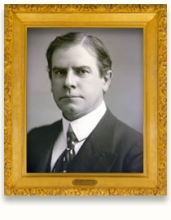Solicitor General: John K. Richards

John K. Richards (March 15, 1856 - March 1, 1909), jurist, son of Samuel and Sarah (Kelvey) Richards, was born in Ironton, Lawrence County, Ohio. Having received his early education in the schools of his native town, John Richards graduated from Swarthmore College with the degree of A.B. in 1875, and two years later received the same degree from Harvard University. Returning to Ironton, he began the study of law in the office of Judge W.W. Johnson, later chief justice of the supreme court of Ohio. In 1879 he was admitted to the bar and in 1880 was elected prosecuting attorney of Lawrence County, serving until 1882. From 1885 to 1889 he was city solicitor of Ironton. In the latter year he was elected a member of the Ohio Senate, where on account of his recognized legal ability he was appointed chairman of the judiciary committee. At the close of his two-year term he was elected attorney general of Ohio and reelected for 1894-96, his term of office being concurrent with those of William McKinley as governor. In 1895 McKinley appointed him member of a commission to codify the insurance laws of the state, and in 1896 he was counsel for a committee authorized by the General Assembly to revise the tax laws of Ohio. In the same year he was general counsel for the state board of medical registration and examiners and also counsel for the board of appraisers and assessors. In 1897 President McKinley appointed Richards solicitor general of the United States. He remained in this office until 1903, when President Roosevelt appointed him a member of the United States circuit court for the sixth circuit, to take the place of Judge William R. Daly, who was elevated to the Supreme Court. Richards remained a member of the circuit court until his death.
While serving as the attorney general of Ohio, Richards successfully fought through the courts the claim of the state that though it had granted the canal beds to these cities for streets and sewage purposes, the cities had no right to turn them over to the railroads and that the railroads must surrender their use to the state. The tax bills which he as counsel for the legislative committee helped to draft, he was called upon to uphold in state courts and in the U.S. Supreme Court. His successful defense of these bills, which taxed the franchises of foreign corporations, the property of interstate express companies by the "unit" rule, and the proportionate share of cars of sleeping car companies, gave rise to decisions which became the basis for much important excise and property-tax law.
As solicitor general, he was called upon to handle the difficult legal questions arising out of the Spanish-American War, particularly in reference to the territory acquired by the United States. A number of the "Insular cases" were argued by him in the Supreme Court, as were also the Joint Traffic Association and the Addyston Pipe & Steel Company cases. He prepared the briefs and handled the Northern Securities case until his appointment to the bench in 1903. He sat on the bench for nine years and wrote during that time over 140 opinions, few being over three pages long, and many only one or two. On June 12, 1890, he married Anna Willard Steece of Ironton, Ohio, who with one daughter and two sons survived him.

 U.S. Department
of Justice
U.S. Department
of Justice